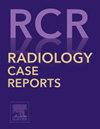Post-transplant lymphoproliferative disorder presented with diplopia; Diagnosis by FDG-PET/CT
Q4 Medicine
引用次数: 0
Abstract
Post-transplant lymphoproliferative disorder (PTLD) is a general term describing lymphoproliferative disorders that develop against the background of immunosuppression after organ transplantation, and that range from benign tumors to malignant lymphoma. PTLD is relatively rare after liver transplantation, and there are few cases of post-liver transplant lymphoma with lesions in the clivus. We here describe the case of a patient who visited our hospital complaining of diplopia after a liver transplant. Fluorodeoxyglucose positron emission tomography/computed tomography (FDG-PET/CT) revealed lesions with high FDG uptake in the clivus and throughout the body, and the patient was diagnosed with lymphoproliferative disease after liver transplantation. The diplopia was thought to have been caused by the clivus lesion infiltrating into the abducens nerve. In patients after organ transplantation, care must be taken to watch for onset of PTLD, and FDG-PET/CT is thought to be useful for its diagnosis.
移植后淋巴细胞增生性疾病伴复视;FDG-PET/CT诊断
移植后淋巴细胞增生性疾病(PTLD)是器官移植后免疫抑制背景下发生的淋巴细胞增生性疾病的总称,范围从良性肿瘤到恶性淋巴瘤。肝移植后PTLD相对少见,肝移植后淋巴瘤伴斜坡病变的病例较少。我们在这里描述的情况下,病人谁到我们医院抱怨复视后,肝脏移植。氟脱氧葡萄糖正电子发射断层扫描/计算机断层扫描(FDG- pet /CT)显示斜坡和全身有高FDG摄取的病变,患者在肝移植后被诊断为淋巴增生性疾病。复视被认为是由斜坡病变浸润到外展神经引起的。对于器官移植后的患者,必须注意观察PTLD的发病,FDG-PET/CT被认为对其诊断有用。
本文章由计算机程序翻译,如有差异,请以英文原文为准。
求助全文
约1分钟内获得全文
求助全文
来源期刊

Radiology Case Reports
Medicine-Radiology, Nuclear Medicine and Imaging
CiteScore
1.10
自引率
0.00%
发文量
1074
审稿时长
30 days
期刊介绍:
The content of this journal is exclusively case reports that feature diagnostic imaging. Categories in which case reports can be placed include the musculoskeletal system, spine, central nervous system, head and neck, cardiovascular, chest, gastrointestinal, genitourinary, multisystem, pediatric, emergency, women''s imaging, oncologic, normal variants, medical devices, foreign bodies, interventional radiology, nuclear medicine, molecular imaging, ultrasonography, imaging artifacts, forensic, anthropological, and medical-legal. Articles must be well-documented and include a review of the appropriate literature.
 求助内容:
求助内容: 应助结果提醒方式:
应助结果提醒方式:


